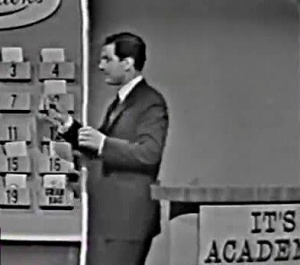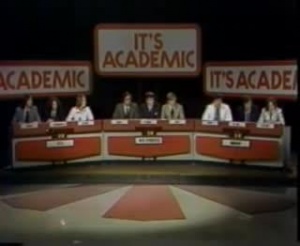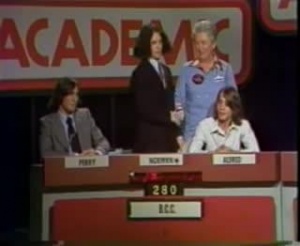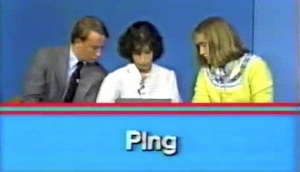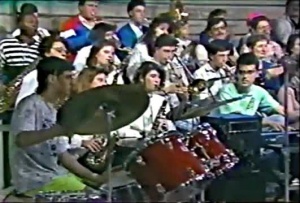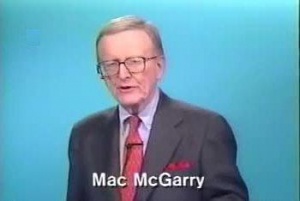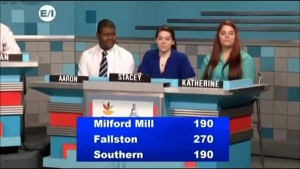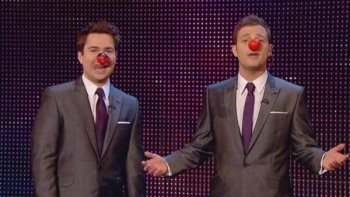Weaver's Week 2014-12-07
Last Week | Weaver's Week Index | Next Week
This week's edition looks overseas, for a show that's been going since forever.
It's Academic
Altman Productions for WRC-TV, WJZ-TV, and other stations
Earlier this year, we looked at some shows that had had a lot of contestants. We stumbled across It's Academic, which has been going for a very long time.
Since 7 October 1961, to be precise. BBC-tv's Saturday night lineup featured Juke Box Jury and Dixon of Dock Green, Thank Your Lucky Stars and The Jo Stafford Show went out on the ITV network, BBC radio included Top of the Form and Life With the Lyons.
Over on WRC, Sophie Altman's idea for a quiz show has finally come to air. It's a simple idea: three teams of three players, questions about "academic" subjects, and the best team wins.
Though it's mostly been shown in Washington and Baltimore – two cities as close as London and Brighton – It's Academic has also been made across the US. The only 1960s edition we've found came from WNBC in New York. Host for the half-hour was Art Bell.
They briefly meet the teams, and spend a bit longer introducing the scorekeepers – also the team's mentors. Art stands by a board containing 20 numbered envelopes, and one is chosen for the first side. The envelope contains ten academic questions, and Art will try to get through all those questions in a minute. That'll take some doing, the trio will need to interrupt most questions to hear them all. Ten points for a correct answer, and a 50 point bonus for getting all ten questions right. This is almost impossible.
After one team has played, the next plays, and the last. Then it's round two. Again, ten questions for the team. Again, ten points for the right answer. This time, it's ten away if the team gives the wrong answer, and five away for a pass. When time expires, other sides can buzz in and answer those passes for 10 points. Giving ten right answers in the 90 seconds is worth 25 bonus points.
Round three is round two repeated, but for double the points. So in about 20 minutes of show, we've had just over 12 minutes of quickfire quiz, each round very similar to the others. Most of the questions have been answered by the team who selected them. The show concludes with a "grab bag" buzzer round, the only buzzer round, played for +- 20 points a question.
It's a strong test of each team's knowledge, each set of questions contains something from most of the defined academic topics (world and local history, geography, visual arts, classical music, branches of science, mathematics). The buzzer round helps to avoid tie-breaks, and helps the show to come out on time. And there's a small test of memory – teams are expected to remember questions the others passed on, initially without prompting from the host.
Sample 1960s Q: In mediaeval times, some men spent their lives trying to turn ordinary metals into gold, and trying to find a universal cure for disease. What is this kind of work called?
Our next episode is the 1975 Washington DC final, aired on WRC. The programme begins with a quickfire "opening scrimmage" round. Ten for a right answer, the question dies if a wrong answer's given. It's a test of buzzer speed and chancing one's arm from very short snippets.
Sample 1975 Q: "Picking Winners" is Andrew Byers'...
That's all we heard! "Horse racing" the answer. After little more than a minute, it's back to the packet round we saw in the 60s. Just as in those earlier days, the round is timed, but there isn't a clock on screen throughout – a countdown only appears in the final seconds, superimposed onto the action.
Mac McGarry is the host in Washington, a respected uncle. He has little ways of signalling unusual questions: "Monitor" comes before a picture question (it would have been shown on the player's monitor). "Choice" comes before a question that will eventually give options, such as:
Sample Choice Q: Unlike light, sound waves cannot be polarised because they are: transverse waves, compression waves, or ether waves?
The team can interrupt if they know the answer to be compression waves, or wait to hear the options. And remember, they'll have to go like the clappers to pick up a bonus. Again, three rounds of this before the grab-bag finale.
On the other side of the pond, it's common for game shows to have a lead sponsor. It's Academic has been associated with the Giant Food supermarket since the beginning. For many years, the sponsor gave money to a "scholarship fund", intended to help one of the high school students continue his or her education at a university.
Every programme, from the merest heat to the frantic final, would end with the sponsor's cheque being handed over to the captain of every team. Someone who worked at a supermarket branch would come in her smock, shake the hand of a spotty student, and pass over a small piece of paper. There's no way that this could ever look natural or unforced. Both player and worker wore faces of extreme embarrassment. This Crowning Moment of Cringe lasted into the present century.
It's Academic has an unusual broadcast arrangement. Separate series are made for schools in Washington DC and in Baltimore, and the shows air on different channels. Each series is a long one – 27 first-round heats begin in September, 9 play-off matches, 3 semi-finals and the final in June. After the finals have been completed, the Baltimore and Washington winners square off in one final match, the It's Academic Super Bowl. Other shows might adopt this format, of two self-contained tournaments with the winners meeting in a final match.
We rejoin the series in 1984, and there have been some changes. A two-tier set puts one of the sides above the others, making better use of the available space in a television picture. And the show isn't just questions picked from packets. That's the second half of the programme.
The first half includes some wordplay questions – anagrams, etymology, quotations, fictional characters, and – what?
Sample 1984 Q: The name you see is missing all its vowels. Can you complete the word to name a modern American scientist, who has received two Nobel prizes, one for peace, the other for chemistry? He's also a firm believer in the healthful properties of vitamin C.
An interesting idea, we didn't see it in the 1989 episode. It's almost ten minutes before we've met all the schools, and they've done their caption round. Then comes a series of picture questions on the buzzer, and a Quickfire Buzzer Round completing phrases and titles on a topic. To discourage speculation, this round is 10 for a right answer, but -20 for an incorrect response. Then, and only then, do we get to the packet round – 90 seconds, ten questions, passes will get passed across.
By 1989, the opening buzzer round was back, and point inflation had taken hold. For no reason, each team was spotted 100 points. We guess that that was to allow point deductions without going into negative scores. The rest of the quiz was unchanged, and we begin to see the little traditions of the show. Like the way Mac McGarry shouts the questions and doesn't stop when he hears a team's buzzer, so he asks them to repeat the answer.
There are more traditions. While introducing themselves, the members of the teams thank their alternate players, their staff members, and their fans for coming to the studio. The staff will appear behind their team at some point. One school will bring a band, another will bring some cheerleaders. And the show still ends with the scholarship cheque, and that's still cringe all the way.
Our next edition came from 2000. Not much had changed, they didn't live under water. The set was still the same as it had been ten years earlier. The host was still the same as it had been ten years earlier. The format, still the same as it had been ten years earlier. The questions, still the same as they had been ten years earlier.
Sample 2000 Q: Billions are spent these days on missiles and other armaments, but a stone thrown from a simple sling allowed the biblical David to slay which giant?
Most questions stem from the school curriculum, from history, geography, civics, maths, science, fine arts, language and literature. Those are the Academic subjects of the title. There's next to no pop culture, little music after 1900, no television shows, no film questions.
OK, there were some small changes. The Big Band Interlude was replaced by an Invasion of the Cheerleaders segment. The value of the sponsor's scholarships had increased – from $300 to $375 for a first-round win. And they'd lessened the Crowning Moment of Cringe by combining it with the announcement of the final score. "In third place, with 390 points, and a $275 scholarship from Giant Food, is Chopper Town." The applause is for the teams as much for the prize.
After the 2011 tournament, ill health forced Mac McGarry to retire from It's Academic. He'd hosted the show for fifty years; both show and host received certificates from the Records Book to mark the longest-running quiz show in television history. Mac McGarry died on 12 December 2013.
Such was his stature that one host couldn't fill the dual role. The Washington show is now hosted by Hillary Howard, a radio announcer on news station WTOP. In Baltimore, television announcer David Zahren hosts.
Between 2000 and 2014, little about the show has changed. The set had been modified, but it's still recognisable as a sea-blue and orange construction. Giant Food is still the sponsor, though they don't mention the scholarship grants. The sequence of rounds hasn't changed, though a quick-fire category round in the middle of the show has been retired. In Baltimore, they don't have a scoreboard on the desk in front of each team. In Washington, they do. Each week's episodes are put up on the internet shortly after transmission.
Sample 2014 Q: Arizona's Saguaro national park is named for, and has some of the tallest examples of, what prickly desert plant?
The more things change, the more they stay the same. It's Academic is as constant as the hills, it's not substantially changed in 30 years. There have been versions of the show elsewhere – half-a-dozen local editions in the US, and a national programme on Channel 7 in Australia. Down under, children aged 11-13 competed, about five years younger than in the Americas. Inevitably, that leads to simpler questions, less demanding, and more straightforward. We found the Aussie programme to be as much chatter and filler as actual quiz, a much less substantial watch.
This is a UK game shows site, we need to offer some opinion on whether a UK version could work. Possibly. The national curriculum provides a common base of knowledge, though not necessarily of an academic nature. Being on television is a prize in itself. Blockbusters and First Class The Video Quiz showed that putting schools and sixth-formers on telly could turn in some ratings, but that evidence is 30 years old and a lot has changed since.
Programmes for teenagers is a dead spot in BBC television commissioning, it's the age group the corporation doesn't target. A local battle between local schools is too parochial for ITV in England, and lax regulation has allowed ITV to stop making local entertainment shows. If It's Academic can come to the UK, it could be on STV or UTV in Scotland or Northern Ireland. Or it could be a suitable show for the new Local TV channels. Low-budget, promotes the channel, cheap, gets people tuning in, establishes community roots, and did we mention it's inexpensive?
This Week and Next
The BBC has a Senior Editorial Complaints Advisor. We know this, because they've investigated a complaint that references to Samantha on I'm Sorry I Haven't a Clue are "highly sexist, offensive and harmful". The advisor rejected the complaint, concluding that while "many of the lines taken out of context on the show would be considered sexist, the impact of the show did not perpetuate prejudice or disadvantage."
Next on the Senior Editorial Complains Advisor's in-tray: whether there was bias on this week's Only Connect because a round on elements was played by Craig Element? Or did Mr. Element spot the element of doubt, and make the elementary decision to eliminate himself from that element of the contest?
As a rule, we don't cover the government's autumn budget statement, as we tend to find it somewhat less interesting than Face the Clock. That, and the way the Finance Minister can't be bothered to give the speech himself, and lets the work experience kid do the dull work.
This year, we hear of a tax break for children's television, so that live-action productions made in the UK will get additional funding. Similar schemes have worked to the benefit of theatre, video games, film, drama for adults, and animations. We hope to live in a world where Fort Boyard isn't the biggest live-action show that CITV makes. And – just maybe – a world where it's not the best CITV show, because something even better has come along.
On University Challenge, this week's match saw Gonville and Caius Cambridge beat Manchester by 200-135. The second defeat for Manchester The Team Everyone Wants To Beat should see them eliminated from the contest. But you never know with UC, the defeat won't be final until we see G&C next year.
On Only Connect were the History Boys meet the Felinophiles. Both sides had won a game already, so a loss tonight won't eliminate them. The History Boys scored one from "January": the question asked after politician Oswald Mosley, the historical Polish revolution, a pop single for Pilot, and the film character of Betty Draper. High and low culture, academia and pop in forty seconds.
Patents gave two to the Felinophiles, rainbow flags one for the History Boys. "Father and child playing father and child" is the link between some movies, but that evades both sides. Bands with rhyming names gets two for the History Boys, and things you can't do in a swimming pool gives three to the Felinophiles. "We were thinking of pet in that picture," clarifies Victoria, for no reason at all. 5-4 to the Felinophiles.
States bordering other states from 3 Connecticut to 0 Hawaii earns a couple for the History Boys. The official lists of UK common dogs is a bonus for the History Boys, but how does one have an "official" registration since they abolished the dog license? They get three more from a question they'll love in Canada, eh eh eh eh down to a single A. The Felinophiles know they need to score big, they know it's Star Wars, but they leap over a generation, and omit Anakin Skywalker.
An audio sequence? Saturn's rings! Ray Charles, the Arrival of the Queen of Sheba, in the Hall of the Mountain King. So, no, not Mack the Knife, but Creamy Muck Muck Time! That's one bonus for the question, and no bonus for the singing. Leave that to the celeb editions. Neither team is sharp enough to spot sections of a dartboard. That early break has given the History Boys a good lead, 11-6.
The Felinophiles make very light work of their wall. Pulp songs, charity organisations, tv cops, and agony aunts. Ten points! History Boys get Muse songs, films ending in "Express", bears, and things they can make from bark. No, not things they make from bark, words with numbers written in them. Ten points!
21-16 into the Missing Vowels, where domestic assistant ends 2-2. History Boys stretch it by 3-1 in Former Football League Grounds, and take chemical elements and symbols by the same score. A 29-20 win for the History Boys, who go through to the quarters.
To Mastermind, where Humpo actually said "It's not known as television's toughest quiz". Honesty in broadcasting! At last! Bill Carey was this week's winner. He took Brian Epstein, and took the Beatles' manager for a Perfect Round, 15 (0). Set seven to win, he started slowly and never got out of third gear, but still reached 27 (3). A lucky draw might see him to the final.
Katy Bateman answered on Dr Who 2005-present. One pass spoiled a perfect round, 14 (1). Second round went phut on the third question, and never recovered. 21 (6) is scant reward. Michael Wright had the Anglo-Zulu War of 1879, and recovered from a massive wobble to 10 (0). Second time, stodgy progress and much guesswork to 20 (1). John Wheeler studied the Lost Rivers of London, ones that have been built over or filled in. Almost as many misses as hits took him to 9 (2); he's confident in general knowledge and reaches 19 (4).
BARB ratings for the week to 23 November.
- Another week, another win for Strictly Come Dancing. 10.35m saw the hoofing on Saturday night.
- I'm a Celebrity remains popular, peaking with 8.7m viewers. It's damaged The Apprentice, down to 6.75m.
- The X Factor retained 6.85m for performance and results shows, but that's behind all episodes of I'm a Celeb, and every trip to Coronation Street.
- Masterchef The Professionals pulled 3.7m, well clear of University Challenge (2.75m). The Great Interior Design Challenge had 1.9m viewers at its peak. The Chase hits a teatime record of 3.13m viewers.
- 1.2m for Coach Trip, 1.1m for Out Of Here Now on ITV2, and no other game show beat Come Dine on More4 with 380,000 viewers.
Remember The Apprentice? Not many people do, Wednesday's show proved less attractive than watching paint dry. In his latest attempt to stir up column inches, Alan Sugar showed what his spine was made of. Asked to get an anatomical skeleton at least 150cm high, both teams got an anatomical skeleton at least 150cm high. One skeleton was made of plastic, the other of paper. Mr. Sugar kicked off.
Mr. Sugar's shopping list hadn't included what he really wanted: publicity for the series. Any show that manufactures rows for the sake of ratings is on its last legs. Mr. Sugar wants more free airtime on national television. Mr. Sugar is just saying things to get a reaction. Mr. Sugar is trolling the nation. Pass our hat, we're leaving.
Still with failures of capitalism, there's no Puzzled Pint in London this month. Pubs were asking many hundreds of quid to hire rooms, and we don't even get to keep the carpet afterwards. The result is that the room isn't hired, the pubs have lost goodwill, and they've lost custom (because when the Week's team turns up, we drink in order of the Greek alphabet). To replicate the experience at home, cut out the crossword and headlines from Tuesday's paper, and fit the headlines into the crossword grid. For added realism, get someone to read bad jokes over your shoulder from time to time.
The grand final of I'm a Celebrity... Get Me Out of Here! (ITV, Sunday) means it must be December. Further evidence: Choir of the Year (BBC4, Friday) and Celebrity Juice Christmas Special (ITV2, Thursday). Next Saturday, Pointless Celebs (BBC1, 6.10) has Keith Duffy, Carol Decker, and Paul Young; The Chase With Celebrities At Christmas (ITV, 7.25) includes Ben Miller, and The X Factor Final kicks off at 8.25.
Photo credits: WRC-TV, WNBC-TV, WJZ-TV, BBC Glasgow, Thames. Video courtesies: Blanquepage / tvgameshowvault, Jim Esserman, Michael M Hughes, Michael Pannoni, Ben Newton, It's Academic. Tiddles is fed and fine.
To have Weaver's Week emailed to you on publication day, receive our exclusive TV roundup of the game shows in the week ahead, and chat to other ukgameshows.com readers, sign up to our Yahoo! Group.


